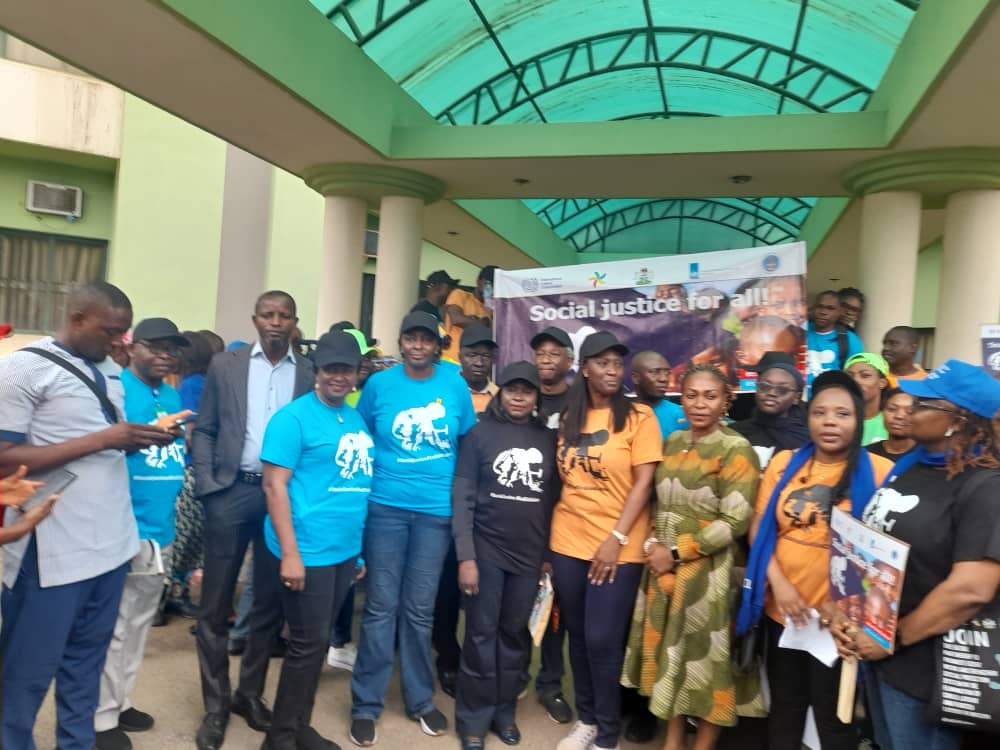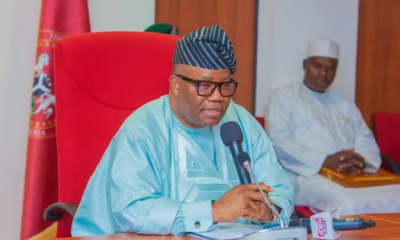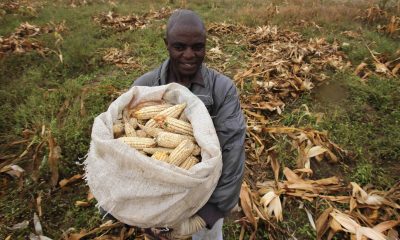News
FG restates commitment to elimination of child labour in Nigeria
Published
9 months agoon

The Permanent Secretary, Federal Ministry of Labour and Employment, Kachollom Daju ,mni, has restated the commitment of the Federal Government to elimination of Child Labour. The Permanent Secretary stated this in her address during the commemoration of the 2023 World Day Against Child Labour (WDACL) in Abuja. This was contained in a statement signed by Olajide Oshundun, Director, Press and Relations. The Commemoration which was observed by the ministry in collaboration with the National Steering Committee on the Elimination of Child Labour (NSCCL) has the theme: “Social Justice for All. End Child Labour”. Her words: “The 2023 World Day Against Child Labour calls for:
- “Reinvigorated international action to achieve social justice, with the elimination Child Labour as one of its key elements;
- Universal ratification of ILO Convention No 138 on Minimum Age and ILO Convention 182 on Worst Forms of Child Labour.
- “Effective implementation of the Durban Call to Action.
The Federal Government recognizes the importance of addressing the issue of child labour and reiterates its commitment to eradicating the menace”.
According to the Permanent Secretary, Labour is a grave concern that affects millions of children worldwide, denying them of their fundamental rights to education, health, mental and moral development and a childhood free from all forms of exploitation. She further noted that in Nigeria, it is estimated that over 43 % of Nigerian children aged between 5 and 11 years are involved in economic activities, including being engaged in the worst forms of Child Labour. She said: “According to the 2016 – 2017 MICS Survey, 39 % of children involved in child labour are working under hazardous conditions including quarrying granite, artisanal mining, commercial sexual exploitation, armed conflict, and sometimes are victims of human trafficking. These figures reflect the degree of urgency required by the various actors working on child labour to proffer solutions to the reduction and possible elimination of child labour in Nigeria and globally.
“The WDACL serves as a reminder that the fight against child labour requires sustained efforts and collective action the whole society.
“The commitment of the Federal Government of Nigeria in contributing to the global fight against child labour and its worst forms, is evidenced in the following interventions, programmes, activities and partnerships:
- The adoption and ratification of ILO Conventions No.138 and No.182.
- “Enactment of the Child Rights Act to domesticate the UN Convention on the Rights of the Child. The 36 States of the Federation and the FCT have domesticated the Child Rights Act.
- “Review of the National Policy on Child Labour and the National Action Plan on the Elimination of Child Labour.
- Development of the List of Hazardous Child Labour.
- Review of the Labour Act to mainstream Child Labour into the Labour Standards Bill which replaces the Labour.
- “Adopting 15 years as the minimum age for employment.
- Development and validation of Child Labour Reporting App and National Referral Mechanism (NRM) in collaboration with the ILO through the ACCEL Africa Project.
- “Conducted the Child Labour and Forced Labour Survey in collaboration with National Bureau of Statistics and the ILO through the ACCEL Africa Project.
- “Development and validation of a compendium of legal framework on the elimination of Child Labour and protection of children in Nigeria.
- “Development and validation of simplified Child Labour related laws in Nigeria.
- Development and validation of National Social Behavioral Communication Change Strategy (NSBCC).
- “Annual commemoration of the June 12th World Day Against Child Labour (WDACL).
- “Nigeria became a Pathfinder country of Alliance 8.7 of the Sustainable Development Goals (SDGs) in 2019, with the commitment to take immediate and effective measures to eradicate forced labour, end modern slavery and human trafficking and secure the prohibition in the recruitment of child soldiers, and eliminate Child Labour in all its worst forms by 2025.
- “Collaborating with the ILO, through the ACCEL Africa Project, the Action Against Child Labour in West Africa (ACLAWA) and Global Accelerator Lab (GALAB).
- “Establishment of the National Steering Committee on the Elimination of Child Labour (NSCCL) to strengthen institutions mandated to monitor the elimination of Child Labour across the country.
- “The constitution and inauguration of the State Steering Committees on the Elimination of Child Labour (SSCCL) across the 36 states of the Federation and FCT.
“Some of the challenges in the elimination of Child Labour in Nigeria include: - Poverty.
- Cultural/Religious factors.
- Poor educational system.
- Inadequate Social Protection systems.
- “Wrong perception/ ignorance of the negative effects of Child Labour.
“The Ministry commits to:
I. Continue active collaboration with relevant stakeholdersto develop and implement collective strategies that contribute to the eradication of child labour.
“II. Engage in advocacy interventions to encourage government (Federal and States) and policymakers to enact and enforce legislation that protects children from exploitation and ensures access to quality education.
“III. Provide support to grassroots organizations and implement initiatives dedicated to combating child labour, rehabilitation and empowerment of child labour victims and vulnerable households”. The ceremony was preceeded by a Road-Walk which took off from the Federal Ministry of Justice to National Human Rights Commission and back to the Federal Secretariat through Adetokunbo Ademola Crescent, Wuse 2, Abuja.
Trending

 Latest1 day ago
Latest1 day agoObi advocates productivity, leadership commitment as invaluable insights for nation’s growth, as in Brampton, Canada

 Crime3 days ago
Crime3 days agoFuel scarcity: Trigger-happy policeman fatally shoots man who try to stop him from jumping queue at a filling station

 Editorial6 days ago
Editorial6 days agoGovernor Obaseki Increases Minimum Wage to N70,000 in Edo State

 Agribusiness4 days ago
Agribusiness4 days agoGMO crops will render Africa farmers more reliant on multinational corporations

 Business5 days ago
Business5 days agoNNPC says fuel queues to be cleared by Wednesday

 Featured5 days ago
Featured5 days agoNigeria confronted with multifaceted challenges – Akpabio

 Agribusiness5 days ago
Agribusiness5 days ago9 reasons why African farmers should reject GM crops

 Crime3 days ago
Crime3 days agoMandi, mastermind behind Abuja-Kaduna train attack arrested

